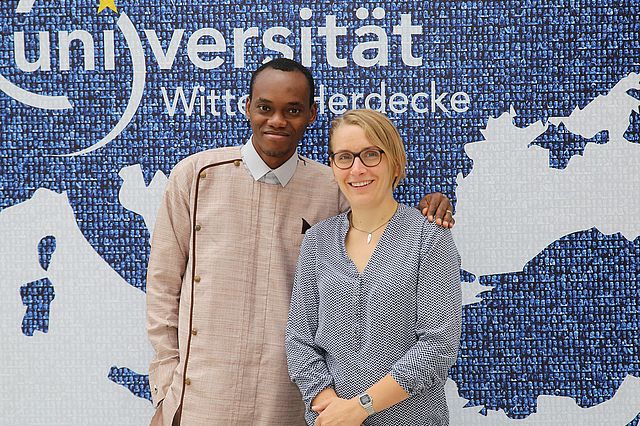Joint Research of Students and Professors at UW/H: An Interview with Jun-Prof. Dr. Magdalene Silberberger
Joint Research of Students and Professors at UW/H: An Interview with Jun-Prof. Dr. Magdalene Silberberger
We interviewed Jun.-Prof. Dr. Magdalene Silberberger about her joint research work with UW/H M.A. PPE alumnus Carlos Mairoce from Mozambique and Waidi Adebayo from Nigeria. How did a student interest turn into a published paper in a top academic journal and what do students bring to the table that fellow researchers lack?
Within the course of their international master’s degree at UW/H, the international PPE students Carlos Mairoce from Mozambique and Waidi Adebayo from Nigeria started to engage in joint research projects with Jun.-Prof. Dr. Magdalene Silberberger. What started out as classroom discussion and independent study project, evolved into a recently published paper and whole new research project.
International Office: Together with Carlos Mairoce and Prof. Dr. Joachim Zweynert you recently published a paper on multinational enterprises, political institutions and violence in Mozambique. How did the paper emerge, and how was its development process different from a professor-only research cooperation?
Magdalene Silberberger: In 2018, in his course on institutions and development, Prof. Zweynert discussed the case of a Swedish multinational enterprise in the mobile telecommunications sector that when doing business in Russia tried to stick to the Swedish way of doing business – with the result that it was forced out of the market pretty quickly. Carlos Mairoce reacted to that by saying that he knew of a similar story. However, he said, the case ended differently: When this enterprise came under heavy pressure, it handed over a large packet of shares to the President of the country. After that, it soon became market leader in Mozambique. Prof. Zweynert told me about this story, and we decided to encourage him to do research about the case. Carlos led a lot of interviews, analyzed press reports and started to put the pieces of the puzzle together. It was our job, to embed the case into a theoretical framework and relate it to the existing literature on institutions in crony capitalism. All in all, from the submission of Carlos’ independent study, it took us another two years of hard work to come up with a publishable article. The starting point was unusual, having bits of information in an independent study and we needed to be very thorough to not just assume, but in an academic sense prove something that was common knowledge to Carlos. Other than that our work was very similar to the one we have with other co-authors, each person has their expertise and their part to contribute.
International Office: Your book chapter with Waidi Adebayo on the cassava value chain in Nigeria resulted in the founding of a whole new research project, which was recently granted the Humbolt Research Fellowship. What’s the project about and which steps are planned for its development in the next years?
Magdalene Silberberger: It is somewhat more complicated than that. About 10 years ago, I met a young researcher from Nigeria, Evans Osabuohien, on a workshop for young African researchers in Ghana that I was organizing with my PhD supervisor Matthias Busse. We lost track of each other until we met again at a Conference in 2015 and started to intensify our cooperation. When Waidi Adebayo approached me with the idea of writing a PhD thesis on agriculture, in particular cassava as this is his particular field of interest, I immediately thought of Evans and started to jointly supervise Waidi. It was from this supervision that the idea emerged to look at the Cassava Value-Chain and its huge potential in more detail. We received funding from the Alexander von Humboldt Foundation and for the next two years Evans, Waidi, joined by two additional researchers from Nigeria, will be investigating the impact and the potential of the cassava value chain on the livelihoods of the rural population, in particular of females and the youth, as these are most vulnerable. Depending on the COVID-19 situation next year, we are planning field trips in Nigeria to evaluate these issues and a workshop for young African Scholars that are working on the topic of agricultural value chains, similar to the one that brought Evans and me together 10 years ago. We intend to push research on this extremely relevant but often neglected issue by linking researchers. Waidi is our Cassava expert and every time we meet for our monthly updates, I am extremely proud of how far he has come from his first stay in Witten and all the skills and knowledge he has gained during his PPE Master.
International Office: Why do you think such joint research projects with students are possible at UW/H and what do you enjoy most when working on them?
Magdalene Silberberger: First of all, and very simple, we have fewer students. That allows me to listen to the ideas they have in mind for any kind of research and the topics that interest them the most, rather than providing them with lists of topics that I have expertise in. Second, our admission seminars ensure that we have very interesting students with a variety of backgrounds. It is hard to find anybody who is not passionate about something. These two factors lead to a stronger institutional openness towards a broad set of topics. I find it truly inspiring to gain insights into different issues that students want to explore further via academic research. I also find students generally more open and less biased and path dependent than fellow researchers as they do not have to think in frameworks of publishable papers but rather do what interests them. Often, we have to narrow the big questions they want to answer down quite a bit but in general, their openness is very stimulating.
Interview conducted by Lea Herrmann, Student Assistant, International Office
Overview
Die Universität Witten/Herdecke ist durch das NRW-Wissenschaftsministerium staatlich anerkannt und wird – sowohl als Institution wie auch für ihre einzelnen Studiengänge – regelmäßig akkreditiert durch:







